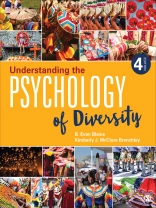Understanding the Psychology of Diversity offers a highly accessible examination of diversity to show students how to understand social and cultural differences in today’s society. Taking a psychological perspective, authors B. Evan Blaine and Kimberly J. Mc Clure Brenchley explore how individuals construct their view of social diversity and how they are defined and influenced by it. The book covers traditional topics like categorization and stereotypes, sexism, racism, and social stigma, as well as non-traditional topics like sexual orientation-based prejudice, weight and appearance-based prejudice, diversity on television, and age stereotypes and ageism. The
Fourth Edition confronts the credibility crisis that has surfaced in the academic psychological research community by following parameters for the research that is presented.
Jadual kandungan
Preface
Acknowledgments
Chapter 1 Introduction to the Psychology of Diversity
Diversity Is Social Difference
Making Sense of Diversity
The Psychology of Diversity: A Conceptual Framework
Summary
Chapter 2 Categorization and Stereotyping: Cognitive Processes That Shape Perceived Diversity
Social Categorization
The Neuropsychology of Categorization
Stereotyping
Consequences of Social Categorization and Stereotyping for Perceiving Diversity
Summary
Chapter 3 Stereotypes Expressed: Social Processes That Shape Diversity
The Self-Fulfilling Prophecy
Stereotypes Expressed in the Media
Summary
Chapter 4 Prejudice: Evaluating Social Difference
Prejudice: Basic Concepts
Self-Esteem and Prejudice: Using Prejudice to Define and Defend Ourselves
Anxiety and Prejudice: Using Prejudice to Reassure Ourselves
Summary
Chapter 5 Understanding Racial Stereotypes and Racism
Race and Ethnicity
Racial Stereotypes
Racism
Summary
Chapter 6 Understanding Gender Stereotypes and Sexism
Gender Stereotypes
Gender Differences and Similarities
Explaining Gender Differences
Summary
Chapter 7 Sex Stereotypes and Heterosexism
Sexual Minority Categories and Sexual Orientation
Summary
Chapter 8 Obesity Stereotypes and Weightism
Obesity Stereotypes
Weightism: Weight-Based Prejudice and Discrimination
The Psychological and Social Consequences of Weightism
Summary
Chapter 9 Age Stereotypes and Ageism
Old-Age Categorization and Stereotyping
Old-Age Prejudice
Are Old-Age Stereotypes Self-Fulfilling Prophecies?
Discrimination of Older Workers
Summary
Chapter 10 Social Stigma: The Experience of Prejudice
Understanding Stigma: Basic Components
Dimensions That Affect Stigma
Implications of Stigma for Identity: Mindfulness and Stereotype Threat
Summary
Chapter 11 Coping With Social Stigma
Social Consequences of Stigma
Psychological Consequences of Stigma
Physical Consequences of Stigma
Positive Consequences of Stigma?
Coping With Prejudice: Stigma Management
Summary
Chapter 12 Responding to Social Inequality: Behavioral and Cognitive Interventions for Reducing Prejudice
Behavioral Interventions
Cognitive Interventions
Summary
References
Index
About the Authors
Mengenai Pengarang
Kimberly J. Mc Clure Brenchley is an associate professor of psychology at St. John Fisher College in Rochester, New York, where she resides with her husband, James, and children, Jackson and Evie. She earned her Ph D in social psychology from the University of Connecticut, where she also received graduate certificates in both quantitative research methods and college instruction. Dr. Mc Clure Brenchley’s primary research focus is on the stigma of overweight, examining both the mechanisms behind weight stigma and the processes by which possessing this stigmatized identity can influence health and psychological well-being. She teaches courses related to social psychology, health psychology, and statistics.












